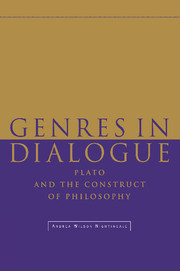Book contents
- Frontmatter
- Contents
- Acknowledgments
- Abbreviations and texts
- Introduction
- 1 Plato, Isocrates, and the property of philosophy
- 2 Use and abuse of Athenian tragedy
- 3 Eulogy, irony, parody
- 4 Alien and authentic discourse
- 5 Philosophy and comedy
- Conclusion
- Bibliography
- General index
- Index of passages from Plato
4 - Alien and authentic discourse
Published online by Cambridge University Press: 23 October 2009
- Frontmatter
- Contents
- Acknowledgments
- Abbreviations and texts
- Introduction
- 1 Plato, Isocrates, and the property of philosophy
- 2 Use and abuse of Athenian tragedy
- 3 Eulogy, irony, parody
- 4 Alien and authentic discourse
- 5 Philosophy and comedy
- Conclusion
- Bibliography
- General index
- Index of passages from Plato
Summary
Heard melodies are sweet, but those unheard
Are sweeter.
Keats, “Ode on a Grecian Urn”language is a virus from outer space.
William S. BurroughsWe believe that we live in the “age of information,” that there has been an information “explosion,” an information “revolution.” While in a certain narrow sense this is the case, in many important ways just the opposite is true. We also live at a moment of deep ignorance, when vital knowledge that humans have always possessed about who we are and where we live seems beyond our reach. An Unenlightenment. An age of missing information.
Bill McKibben, The Age of Missing InformationAs we have seen in the previous chapters, Plato attempts in a number of dialogues to distinguish philosophy from traditional genres of discourse. Philosophical language, he suggests, is not only new and different: it is superior to all other kinds of discourse. The Phaedrus, however, takes a different tack. For it abandons the notion that traditional genres of poetry and rhetoric are inherently “unphilosophical.” This means that it is at least possible for one or another genre to make a positive contribution to the project of philosophy. The Phaedrus targets a number of generic subtexts, but handles each in a different way: while some genres are subjected to parody, others are granted full semantic autonomy. In the latter cases, Plato disrupts the boundaries that he had previously drawn between “philosophy” and “non-philosophic” discursive practices.
- Type
- Chapter
- Information
- Genres in DialoguePlato and the Construct of Philosophy, pp. 133 - 171Publisher: Cambridge University PressPrint publication year: 1995

